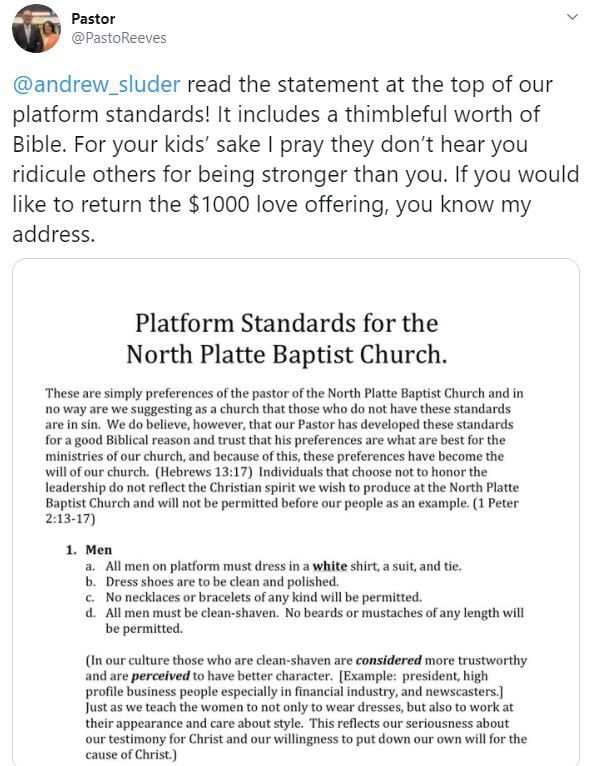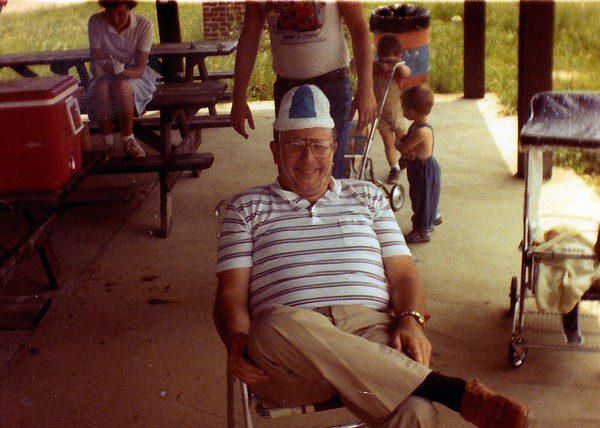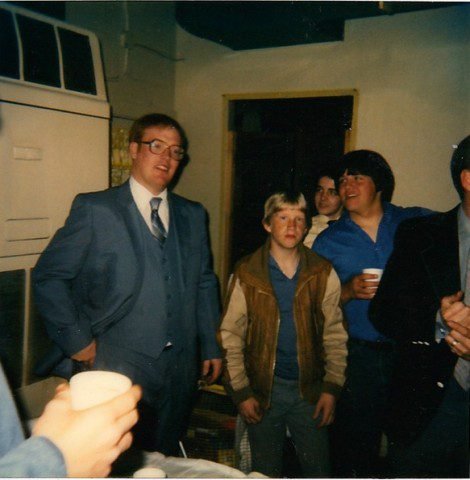
Many Independent Fundamentalist Baptist (IFB) churches have what are commonly called staff or worker standards. These rules strictly regulate what church staff and church workers wear, how they look, and how they behave. Some churches even require staff members and workers to sign their names to these rules, thus signifying an agreement between them and the church. Not abiding by these rules usually results in loss of employment or loss of ministry opportunities. All too often the offender is labeled rebellious or a backslider and run out of the church.
In the fall of 1979, I resigned from Montpelier Baptist Church in rural northwest Ohio and moved to the central Ohio community of Newark with my wife and newborn child. Polly’s maternal uncle, the late James (Jim) Dennis, pastored the Newark Baptist Temple — a hardcore IFB institution. Polly’s father, Lee, was the church’s assistant pastor. We planned to join the Baptist Temple and serve the Lord there while waiting on God to direct us to our next ministry opportunity. (Please see The Family Patriarch is Dead: My Life With James Dennis.)
The church needed someone to oversee its bus ministry (unpaid). I thought, at the time, that doing this would be a perfect opportunity to put my Bible college training and skills to work. Instead, Pastor Dennis told me that he couldn’t give the position to me because it would like he was playing favorites with family. Later behavior would suggest that his real problem was with me personally. Numerous other family members would work for the Baptist Temple, just not Bruce Gerencser. This initial bit of conflict between us led to four decades of what can best be described as an adversarial relationship. I suspect that the root of the problem traces back to the fact that Pastor Dennis did not want Polly to marry me, and neither did Jim’s wife nor Polly’s mother. Yet, here we are, 42 years later.
Granted, I was a contrarian, not afraid to speak my mind. This put me in the doghouse more than a few times. Let me give you a couple of examples related to church staff and church worker standards. I taught Sunday School, drove a bus on Sunday, and helped do mechanical work on the busses during the week. Polly worked in the nursery, sang in the choir, and worked for the church’s non-licensed daycare. She later taught one year of third grade for the church’s non-accredited school, Licking County Christian Academy. At the time, I was a general manager for Arthur Treacher’s in Reynoldsburg, and later part of a new store management team that opened stores for Long John Silver’s in Zanesville, Heath, and Westerville
As workers at the Baptist Temple, we were required annually to read and sign the church’s standards. Polly quickly signed, but I refused to do so. I thought then, and still do, that it was manipulative (and stupid) to demand people sign the standards; that the only person I was accountable to was God. My “rebellion,” of course, caused quite a stir in the church. “Poor Polly,” people thought. “Bruce needs to get right with God!” The real issue wasn’t my “heart,” as much as it was my refusal to play by Pastor Dennis’ rules.
Pastor Dennis’ church standard regulated everything from length of hair, facial hair, what women and men could wear clothing-wise, and what entertainments people could participate in. The spouses and children of staff and church workers were expected to obey these rules too.
Refusing to sign caused a huge rift between Pastor Dennis and me, one that never healed. Because I refused to sign, I was removed as a Sunday School teacher. Ironically, I was still allowed to drive busses and repair them during the week. Nothing changed for Polly. I suspect this was due to the fact that Polly was so quiet and passive, and I was so outgoing and outspoken, that people saw me as Polly’s overlord Polly as a wife who dutifully followed her husband’s edicts. To this day, some family members refuse to see that Polly has come into her own; that the only “boss” in her life is herself. Some ill-informed Evangelical family and friends think that Polly is an unbeliever only because I am; that once I die, she will come running back to Jesus and the IFB church movement. Boy, are they in for a big surprise.
During our time in Newark, I played recreational basketball at least three times a week. During the winter, I would play basketball at the YMCA or join other church men for games at local school gymnasiums. During the summer, I would, after work, join my fellow manager, Neal Ball, at local playgrounds for pick-up basketball games (I also played softball). One day, I drove over to the Baptist Temple to pick Polly up from work. She was working for the church’s daycare, Temple Tots, at the time. I was wearing gym shorts — remember the short shorts of that era — a ratty tee-shirt, white socks, and Converse tennis shoes. As I walked into the church building, Pastor Dennis saw me. Like a bull charging a red cape, Jim came towards me, letting me know that I couldn’t enter the building dressed as I was. He was livid, and so was I. How dare he respond to me like this. I was just there to pick up my wife. He stomped off, as did I. He later let Polly know that I was not allowed to enter the building again unless I was dressed properly.
One night, we were at Polly’s parents’ home when Pastor Dennis stopped over for some reason. Polly’s dad was still the church’s assistant pastor, though they had cut his pay and forced him to work a factory job to make ends meet. (The Baptist Temple was notorious for paying poor wages, including paying married women less than men.) Polly’s sister was living at home at the time. She worked for a nearby nursing home. Kathy, dressed for work, came down the stairs while Pastor Dennis was standing at the front door. He looked up, and much to his horror, saw that Kathy was wearing pants! OMG, right? The good pastor quickly became angry, and with a loud voice lectured Kathy and her mom and dad over the evils of women wearing pants, and that Kathy, as the daughter of the church’s assistant pastor, was required to obey the church’s standard. According to Jim, this was to be the first and last time Kathy wore pants. It wasn’t.
The standards haven’t changed much at the Newark Baptist Temple. Men can now have hair that is a bit longer and are permitted to have facial hair, but the dress standard for staff and church workers remains as rigid and legalistic as ever.
While the Baptist Temple seems extreme to the uninitiated, such rules are not uncommon in IFB churches and colleges. The standards at the Baptist Temple were similar to the rules at the IFB college Polly and I attended — Midwestern Baptist College in Pontiac, Michigan. Pastor Dennis was a 1960s graduate of Midwestern and was later given an honorary doctorate by the college. It should come as no surprise that his rigid legalism matched that of Tom Malone and his alma mater. Polly’s father was also a Midwestern alum.
Yesterday, someone posted the male platform standard for the North Platte Baptist Church in North Platte, Nebraska. The church is pastored by William Reeves. (Three of six church staff positions are held by Reeves’ children — nepotism at its best.) I have written about Reeves and his church before:
- Dear Pastor Reeves, Let Me Explain to You Loving Your Neighbor as Yourself
- North Platte Baptist Church Uses the Coronavirus Pandemic to Evangelize People
If a man wants to be on the platform — the dog and pony show stage — at North Platte Baptist, he is required to dress and look a certain way:

I don’t know the context of the Twitter exchange between pastors William Reeves and Andrew Sluder — pastor of Bible Baptist Church in Asheville, North Carolina. Both men are arrogant, self-righteous pastors who are proud that their IFB dicks are bigger than those of other preachers. What I want to bring attention to is not dick size, but the requirements at North Platte Baptist for any man appearing on the church’s stage.
All men must:
- wear a suit, a tie, and a white shirt
- wear polished, clean dress shoes
- be clean-shaven
Men are not permitted to wear necklaces or bracelets, nor are they to have a beard or mustache of any kind.
Sound crazy or bizarre? Trust me, in the IFB church movement, such standards are quite common.
Keep in mind that these are Pastor Reeves’ rules. He is the CEO, king, and potentate of North Platte Baptist. His word is the law, and those who refuse to play by his rules aren’t welcome.

I find it interesting that the church’s platform standard says that men who have facial hair are not trustworthy and lacking in personal character. Wow! I wonder if they realize that Jesus, the apostles, and the Apostle Paul all likely had facial hair, and that some of the preachers revered by IFB pastors, say Charles Spurgeon, had facial hair. Even God has a beard. I have seen his picture.
And here’s the thing, North Platte Baptist and other IFB churches have lots and lots of rules and regulations governing congregant/staff dress, appearance, and behavior. Rarely are these standards made known to new attendees. Better to hook them first with fake “love and kindness” before letting unwary attendees know, as Paul Harvey would say, “the rest of the story.”
Did you attend an IFB church? Did the church have specific requirements for staff and workers? Did the church have a platform standard? Please share your experiences in the comment section.
Bruce Gerencser, 66, lives in rural Northwest Ohio with his wife of 45 years. He and his wife have six grown children and thirteen grandchildren. Bruce pastored Evangelical churches for twenty-five years in Ohio, Texas, and Michigan. Bruce left the ministry in 2005, and in 2008 he left Christianity. Bruce is now a humanist and an atheist.
Connect with me on social media:
Your comments are welcome and appreciated. All first-time comments are moderated. Please read the commenting rules before commenting.
You can email Bruce via the Contact Form.




